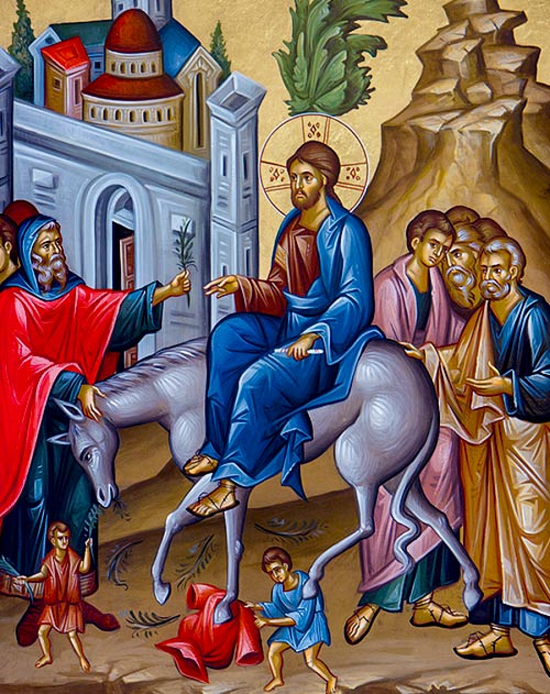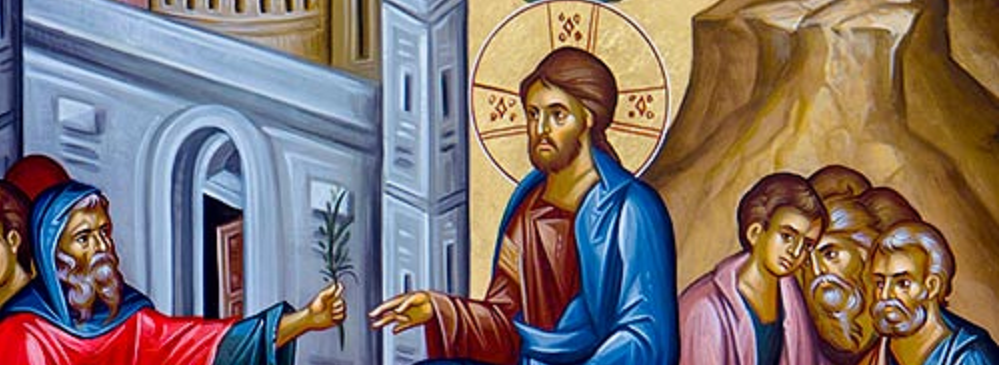Expectations Can Be Deadly
Palm Sunday Scripture Readings

The gospel readings for this Palm Sunday are practically brimming with irony, starting with the little quote from the Prophet Zechariah, “Behold, your king comes to you, meek and riding on an ass, on a colt, the foal of an ass.” Who is this king that Zechariah envisions? He’s the Lord’s anointed, the one who is to come, a king in David’s line and heir to his throne. The Hebrew word for “anointed” is םָשִׁיָח (mashiach), in English, Messiah, in Greek, Χριστος (Christos) or Christ. The vision of the Messiah king in David’s lineage who would restore the fortunes of Israel and Judah entering Jerusalem in procession is a powerful image.
Yet, this Messiah king, foretold by the Prophet, is not pictured as a conquering hero entering Jerusalem at the head of an army. The passage quoted here is one of the few where the Messiah king wasn’t pictured as a great warrior, but rather as one coming into his own, entering Jerusalem as his ancestor David had done generations before. This is not the kind of king the rulers and religious leaders of Israel had anticipated, although somehow the people had intuited that Jesus’s arrival was an important occasion. They called him “Son of David,” after all. Something big was afoot.
The scene that Matthew paints as Jesus enters Jerusalem was taken almost verbatim from a psalm that celebrated the entry of the king into Jerusalem and the Temple. In part, Psalm 118 reads:
Open the gates of righteousness;
I will enter and thank the LORD.
This is the LORD’s own gate,
through it the righteous enter.
I thank you for you answered me;
you have been my savior.
The stone the builders rejected
has become the cornerstone.
By the LORD has this been done;
it is wonderful in our eyes.
This is the day the LORD has made;
let us rejoice in it and be glad.
LORD, grant salvation!
LORD, grant good fortune!
Blessed is he
who comes in the name of the LORD.
We bless you from the house of the LORD.
The LORD is God and has enlightened us.
Join in procession with leafy branches
up to the horns of the altar.
That Matthew and the other gospel writers merged this triumphant, regal procession with the meek ruler spoken of by Zechariah tells us how the early Jewish Christians experienced this reversal of their expectations. This was not the Messiah the crowds had anticipated. Yet, we can sense a revolutionary spirit in the air. After all, this Jesus was the man their leaders had tried to have stoned to death, and yet here he was, big as life, entering Jerusalem openly, almost triumphantly. One might wonder if the crowd wasn’t anticipating that Jesus was going to “stick it to the man.”
Did you hear the cry hidden in the midst of the psalm: “O Lord, grant salvation!”? In Aramaic, Jesus’s native language, that cry sounds like this: Hoshanna! Yes, even in the time of the psalmist, “Hosanna!” was both a cry of support and a cry seeking salvation. Both the cry, “Hosanna!”—save us!—and Jesus’s name, Yeshua—Yahweh saves—contain the Hebrew root, ישׁע (yasha’) “to save.” As they shouted “Hosanna!” the people were literally calling out to the savior to save them.
That’s not all. Today, we read the Saint Matthew passion and encounter a still greater irony. He whom the people greeted with cries of “Save us!” was crucified, and on the cross, he was taunted by the crowds as they mocked him saying, “He saved others; he cannot save himself. So he is the king of Israel!” The reactions of the crowds and their leaders cause us to reflect on our own attitudes. What do you think prevented the people of Jerusalem from seeing what was really playing out before their eyes? I think it was their too-narrow expectations of how God operates in the world. For them, the salvation offered by their God didn’t fit their preconceived notions of what salvation would look like. They cried out for salvation but couldn’t recognize it when it was presented right in front of them. Who could believe for an instant that victory could come through defeat, and life could come through death? How about it? When we ask God to save us, are we ready for an answer that blows our expectations out of the water, or are we more inclined to dismiss God’s grace because it didn’t come to us the way we wanted it to? God doesn’t fit our definitions. God doesn’t follow our rules. God’s answers don’t fit our questions. God is not constrained by our expectations. We can shout, “Hosanna!… Save us!”
Get articles from H. Les Brown delivered to your email inbox.
